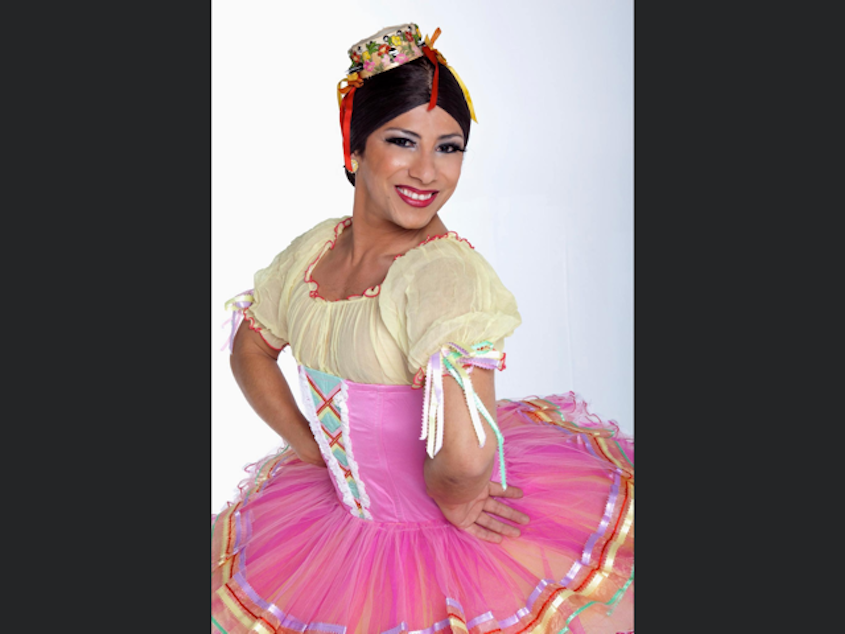Seattle dancer Christopher Montoya says 'I choose to live'

Christopher Montoya was a ballet dancer for most of his adult life.
His career included a stint with the internationally-acclaimed drag company Les Ballets Trockadero de Monte Carlo. But even there, Montoya felt like an outsider.
“Because I was so short, and I was brown,” Montoya says. “Everybody else in the company was white, and I stuck out like a sore thumb.”
Montoya had an extra challenge. When he was a teenager, he was diagnosed with bipolar disorder. When he took his medications regularly, the rigor of the rehearsal studio and his busy performance schedule kept him on an even keel.
But Montoya retired several years ago, and 2020 has been challenging for him, as it has been for so many of us. He’s one of millions of Americans coping with mental illness.
The ongoing pandemic has created new challenges for him, and many others who are seeking first-time treatment for everything from ongoing anxiety to acute depression. Cases could be triggered by grief, physical distancing, job loss, or the pressures of balancing working from home and overseeing children who are doing distance learning.
According to mental health counselor Josh Spell, these challenges can magnify triggers for mental health crises.
Sponsored
“You’re isolated, you’re not interacting in the normal ways you know,” Spell says. “Maybe your coping has changed. Maybe you’re using alcohol more, maybe you’re not talking to people.”
Spell could be describing Montoya’s state-of-mind this past Spring. When the pandemic started, Montoya, a self-described introvert, welcomed the chance to cocoon at home. But faced with extended months of seclusion, he began to experience more periods of mania and depression. He stopped taking his meds, and started drinking.
Ultimately, he took a leave from his job as head of Spectrum Dance Theatre’s school and hunkered down alone.
“To get the edge off, I would just reach for the bottle,” he says. “And the drinking would turn into days, then weeks. And then just completely hiding myself in a bottle of vodka.”
Montoya hit bottom in August.
Sponsored
He checked himself into a hotel, with a stash of liquor.
“I’d drink, then I’d pass out, then wake up and drink some more,” Montoya said.
By day four, Montoya seriously contemplated suicide, but the vision of how this would affect his family stopped him. He called his therapist from the hotel room and ultimately checked himself into a residential treatment program.
According to the Washington State Department of Health, as many as 2 million state residents may find themselves in similar situations this fall. Mental health experts believe acute anxiety and stress exacerbated by the pandemic, coupled with the decreased hours of daylight and the approaching winter holidays, may lead to increased suicides.
They advise people to reach out for help, but the societal stigma about mental illness is hard to overcome. For Montoya, and many fellow dancers, admitting they need help is even trickier.
Sponsored
“This is something that is never talked about in the dance world,” Montoya said.
Counselor Josh Spell agrees. He danced for 10 years with Pacific Northwest Ballet before switching careers. Spell says the ballet world has been very slow to acknowledge dancers who struggle with mental health challenges.
“It doesn’t really fit with the illusion of what we present onstage,” Spell said.
But things are changing.
This summer, PNB hired Spell to counsel upper level students enrolled in its school. Spell held online seminars about body image, diet and self-care. He’ll meet one-on-one with students who need more attention. Although PNB doesn’t yet have a mental health program for its professional company, Spell is optimistic that will come. In the meantime, he hopes dancers will reach out when they need help, the way Chris Montoya did.
Sponsored
Montoya’s journey hasn’t been easy, but he encourages people to take the first step.
“I made the conscious choice to be sober for myself,” Montoya said. “I made the conscious choice to live.”
The Washington State Health Care Authority has more information about mental health services, including emergency hotlines.
You can also consult with the Washington chapter of the National Alliance on Mental Illness.
Seattle Counseling Services works specifically with the local LGBTQIA community.
Sponsored
Asian Counseling and Referral Service offers programs for all ages, including substance abuse counseling.
You can also contact the Washington Counselors of Color Network.




